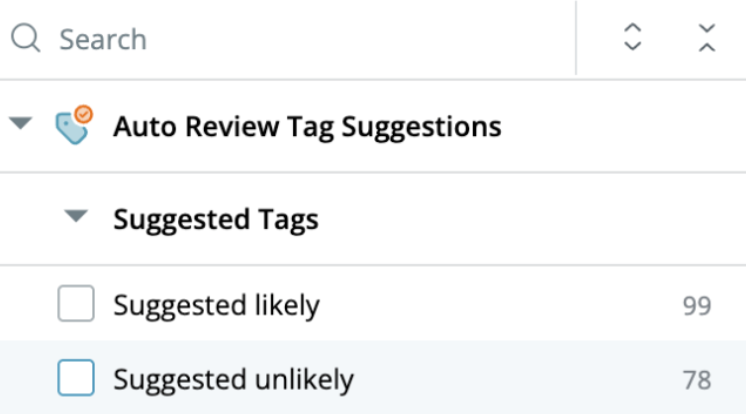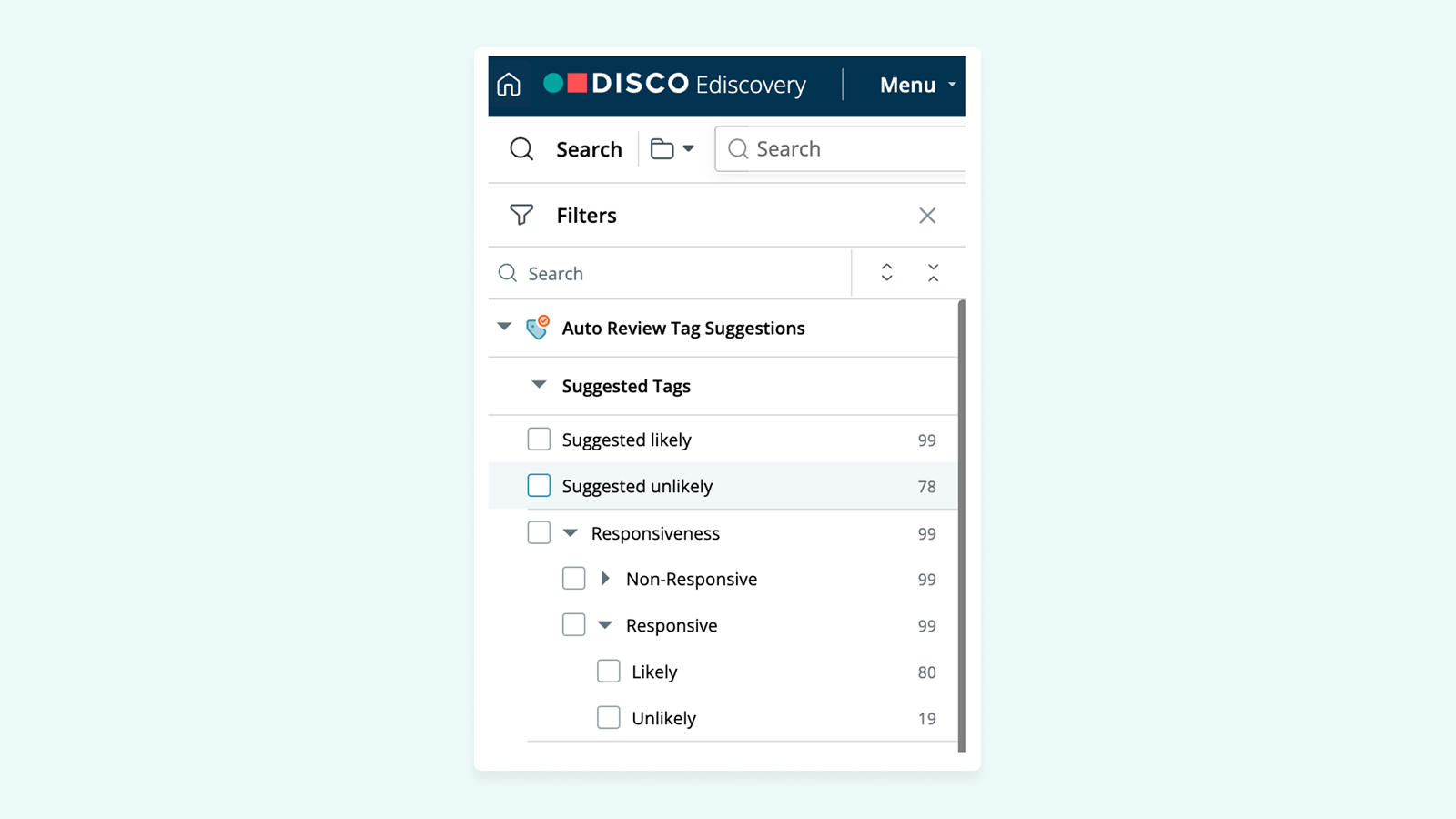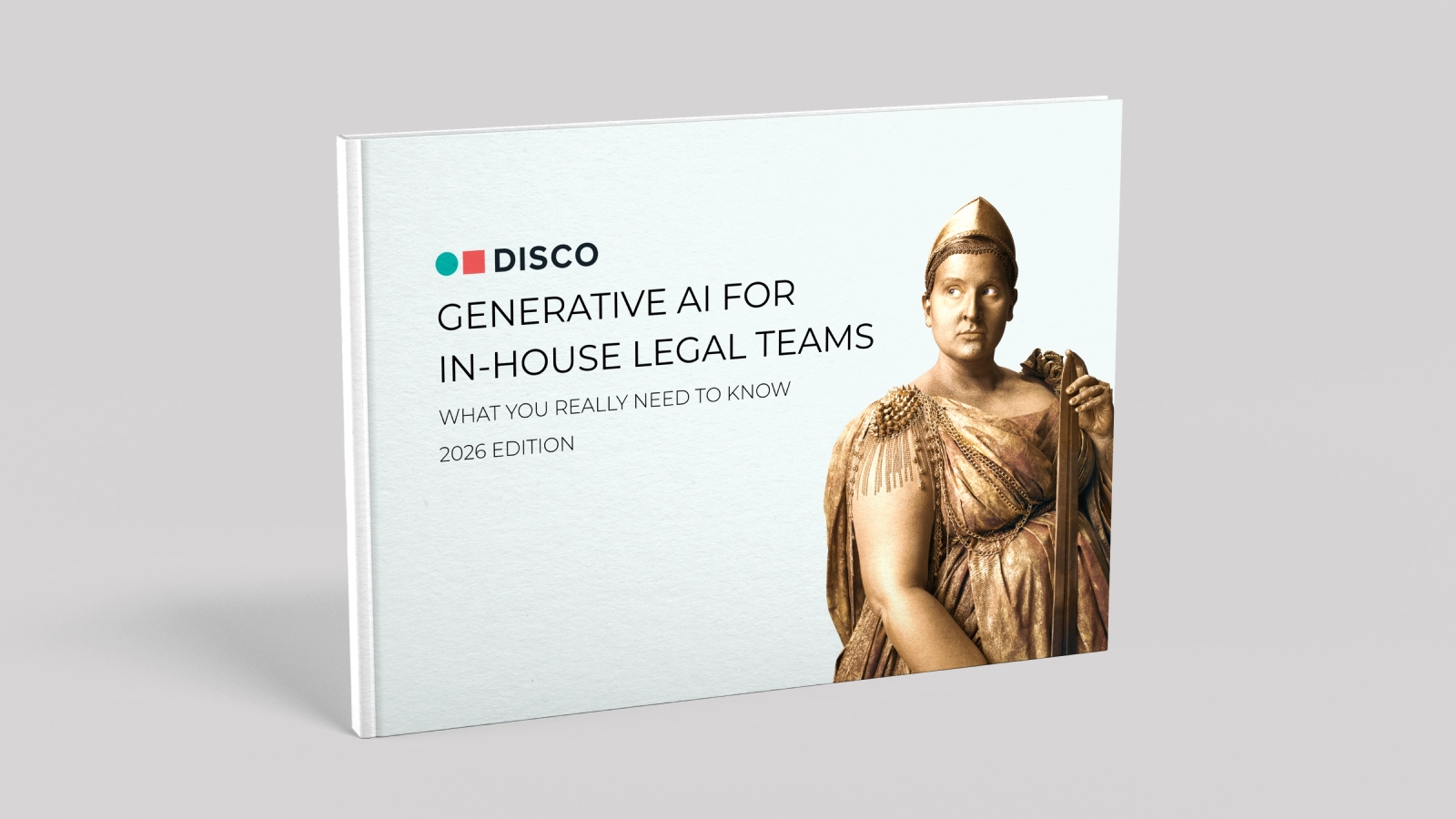⚡️ 1-Minute DISCO Download
As the channels we use for communication have grown more technical and complex, so has legal discovery.
The complexity stems not only from the proliferation of various communication methods (such as short-form messaging applications like Slack and Microsoft Teams, virtual conferencing tools like Zoom, ephemeral messaging like Signal and Snapchat, social media, and more) but also from the accelerating volume of information that organizations produce in the course of day-to-day operations.
For corporate legal teams, which tend to run lean, the daunting prospect of reviewing such a high number of documents often means that outside counsel must be engaged. But outsourcing discovery to external counsel comes with its own challenges — high costs, extended timelines, and limited visibility into early case data. These issues can hinder strategic decision-making at critical stages of legal discovery.
This article will discuss the benefits of ediscovery AI, address the risks that corporate legal teams may encounter, and provide insights and potential remedies for legal teams to mitigate those risks.
Why use AI for legal discovery?
An ediscovery solution with built in AI tools help case teams locate evidence faster helps case teams find evidence faster. It also drives down costs as data sets grow larger and larger every year and the cost to pursue legal disputes increases year over year.
This offers the clear benefit of saving time and staying within a client’s discovery budget. But perhaps the biggest strategic advantage of using AI in the discovery stage is the ability to understand cases and set strategy from the jump.
Being able to assess risk as quickly as possible means you can advise whether to settle or not, or whom to depose first. Without a robust AI tool, initial document review often begins in the dark, with relevant facts becoming clear only many days into the review.
AI-powered ediscovery in action: An Am Law case study
The litigation practice of an Am Law 200 firm, handling multi-party cases with tens of millions of dollars in controversy, faced mounting pressure from multiple directions. Their fast-moving cases, often requiring injunctive relief, demanded rapid and effective ediscovery capabilities.
Meanwhile, clients expected the firm to leverage cutting-edge AI technology to analyze increasingly large document populations and data volumes efficiently.
The head of ediscovery grew frustrated with the status quo: unresponsive vendors, escalating third-party costs, and process bottlenecks. Every data operation — processing, ingestion, culling, or production — required third-party vendor involvement, creating unnecessary delays and generating additional fees. After decades of experience with these third-party vendors, it became clear that the firm needed greater control over their data, processes, and costs.
So the firm partnered with DISCO to implement a comprehensive ediscovery solution that would result in faster, more effective ediscovery processes.
Working with DISCO to utilize AI-powered review workflows, the team was able to quickly identify relevant documents through intelligent tag predictions, dramatically reducing manual review time.
DISCO AI's continuous learning workflows identify responsive document characteristics and surface similar content automatically. Tag predictions improve with each reviewer decision, ensuring the team constantly focuses on the most relevant documents.
DISCO became a trusted advisor to this firm, and hundreds of members of its team now rely on the DISCO software and services. Over the past 8 years, DISCO Ediscovery has been at the center for the majority of its most critical matters.
How AI in ediscovery works
Using a sophisticated, multi-layered computing approach called deep learning, which essentially wires together multiple machine learning capabilities in a very powerful and modular way, AI can easily perform ediscovery tasks that would otherwise be a huge lift for human legal teams, such as analyzing massive data sets to present attorneys with fully cited timelines and links to the most relevant documents, all in response to natural-language queries.
Related: Learn the differences between machine learning, GenAI, and more in our article: AI vs. Generative AI: What's the Difference?
Deep learning and fast text
The first of these AI-driven deep learning components is a technology called fast text. Fast text, which was developed by Meta's AI research, takes words and it converts them to numbers. But it does this in a very unique way that encapsulates the meaning of words in their context.
Because words with similar meanings often occur in similar contexts, fast text is able to extract the meanings of words to an astonishing degree. It learns, for instance, that the two words "king" and "queen" are very similar to the words "man" and "woman." These relationship sequences generated by fast text are then mapped to a 360-degree plane and used for the next step in the deep learning process.
The convolutional neural network (CNN)
The second AI-powered deep learning component takes these sequences from fast text and puts them in order through a convolutional neural network (CNN for short) to begin predicting and making recommendations to the legal team.
Related: A Primer on How Lawyers Can Benefit from Artificial Intelligence 💡
Here's an example to try to bring this to life: Think about this process in the context of facial recognition. When a CNN analyzes an image to determine whether there actually is the presence of a human face, it does it in a very layered and iterative approach, growing in sophistication and complexity as it goes through the layers.
At the basic layers, it's looking for things like skin tone and texture that often indicate the presence of a human being. In the more sophisticated layers, it's looking for things like the shape of eyes, shape of nose, shape of ears. Higher-level, higher layers build on previous layers to ultimately determine and confirm that a face really is present in the frame.
How legal teams can leverage AI in ediscovery
AI technology is no longer a futuristic concept in ediscovery. It’s a practical tool that’s reshaping how legal teams manage complex, high-volume matters. From automating document review to surfacing insights faster and improving early case assessments, AI delivers speed, consistency, and clarity at every stage of the discovery process.
These results are driven by layered machine learning processes that mimic human reasoning, building understanding step-by-step to identify the most relevant information with precision.
AI-driven document review
When it comes to assessing documents, CNNs take a very similar approach, in that they build on a multi-layered process during early stages of the process. For docs, they look for words in the document that are related to particular concepts or topics, or just categories. In later steps, they begin to look at phrases and sentences that might be of interest by breaking down documents layer by layer. The CNN can consider the relationships words have to each other and begin making recommendations that are of high value to the legal team.
Related: How to Use Generative Artificial Intelligence for Document Review 💡
Rather than telling the lawyers what to do, the AI sits in the background, much like a diligent legal assistant who's watching and learning constantly based on the signals that it's receiving from the lawyers who are working on the document sets. It's then building accurate perceptions, and it's actually building perspectives on every document.
Once it's witnessed enough human signals, the AI begins to asynchronously (or, on its own schedule) deliver recommendations to the case team. As AI suggestions are either accepted or rejected by the legal team, the machine's understanding increases and the recommendations improve.
This collaborative and iterative workflow process continues until together the lawyer and the AI have successfully found the vast majority of all relevant material in a data set whilst having only reviewed a fraction of the documents actually in the data set.
Advanced search and analytics
AI-powered ediscovery tools go far beyond basic keyword searches. Instead of relying solely on exact terms, advanced search capabilities use natural language processing (NLP), conceptual search, and pattern recognition to identify relevant documents based on meaning and context — even when specific keywords aren't present.
These tools also offer built-in analytics that surface trends, relationships, and anomalies within data sets. Case teams can visualize communication patterns, identify influential custodians, and trace the evolution of key facts. This level of analysis dramatically shortens the time it takes to build timelines, assess risk, and develop strategy. In short: AI analytics empower teams to see the bigger picture faster.
Early case assessment (ECA)
AI enhances early case assessment by enabling legal teams to quickly analyze large data sets and uncover the scope, relevance, and potential risks tied to a matter — before full-scale review begins. By surfacing key documents, patterns, and communication timelines, AI tools help teams rapidly evaluate the strength of a case, identify custodians of interest, and make more informed decisions about whether to settle or proceed.
This front-loaded insight into the data significantly improves case strategy, budgeting, and negotiation prep. With AI in ediscovery, legal teams can reduce uncertainty in the earliest stages of litigation and proactively shape their approach, saving both time and costs while minimizing surprises later in the discovery process.
Legal disclosure and cross-matter capabilities
Leveraging AI in the disclosure process is frankly just game-changing for the case teams that I work with. From their timelines to their budgets to the development of their case strategy informed by fact evidence – and most importantly, to the outcomes that they're driving to their end clients.
Imagine if you can take the learnings and intelligence that you developed in a single case and bring it to your next case – or maybe even to your next 200 cases.
Well, with cross-matter AI capabilities, you can do just that. You can take highly accurate AI models and use them matter over matter. As these models are used matter over matter, they begin to improve, because they're seeing more and more documents and more and more signals from different case teams.
Corporate teams can curate these cross-matter models to appreciate the uniquenesses of their corporate information and business dealings, while law firm clients can build them around their practice areas.
Related: What You Really Need to Know About Generative AI for Corporate Law 💡
As an example, imagine you are an employment lawyer at a firm, and you specialize in harassment cases. You represent companies in those matters, and in any given year, you might see dozens, maybe hundreds of claims pass your desk. You and your team might review and tag tens of thousands, maybe even hundreds of thousands of documents that are related to harassment.
Imagine the power and the efficiency gains if you could roll up all of those individual moments of learning and use that model case after case from the get-go: very, very powerful.
We're only beginning to understand the use cases that our clients are coming up with for the advanced techniques and unique capabilities of cross-matter AI.
Ediscovery AI: The road ahead
The most powerful AI models in ediscovery don’t just operate on a single matter. They learn across matters, across teams, across time. Legal departments and law firms that begin training and refining these models today are investing in a resource that compounds in value with every use.
Every tagged document, rejected suggestion, and accepted recommendation builds a smarter, more strategic model—one increasingly attuned to your organization’s unique data, cases, and priorities. Over time, these cross-matter capabilities will drive faster risk assessment, stronger litigation outcomes, and deeper institutional insight.
Firms and legal teams that embrace this shift now won’t just keep pace with change—they’ll lead it.
Ready to start using AI for ediscovery?
Looking to streamline your document review process? DISCO is here to help.
DISCO’s top-of-the-line ediscovery platform is user-friendly, featuring advanced search visualization, strong data organization, and a highly secure infrastructure. And now, DISCO’s Cecilia AI is taking litigation to the next level with Cecilia Q&A (the AI assistant that can answer any case-related question), Cecilia Timelines (automatically generated timelines and summarize key facts about your case), and Auto Review – plus, more development to come.
See how we can transform your practice: Request a demo.
Check out the other articles in this series:


.webp)



%20(1).jpeg)








